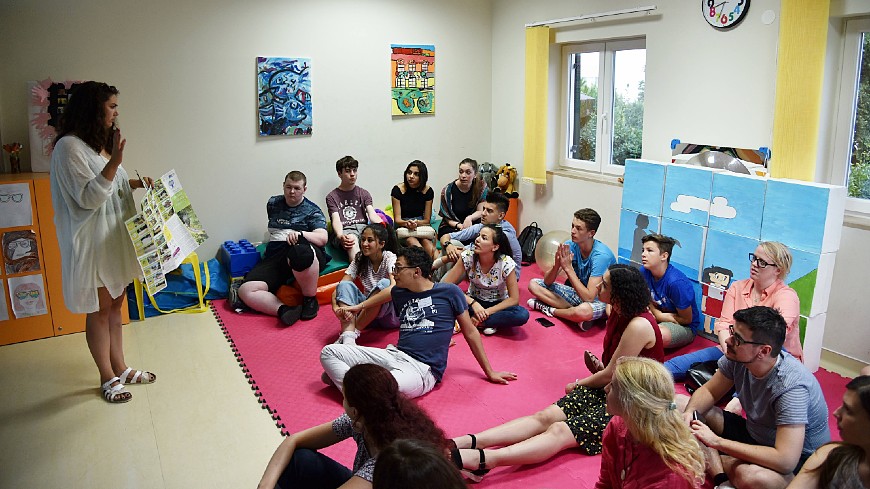Making the Youth Council work in a rural
by Sara Sušanj
30/11/2020
Since 2017, I have been involved in the work of the Youth Council of Opatija, which is established as an advisory board of the City Council that links young people and decision makers and directs youth policies at a local level.
If done right, and in fruitful partnership with decision makers and youth workers, youth councils in small towns and rural areas in Croatia are places of learning about democracy, where youth can host meaningful activities and set their own agenda, be empowered to become active citizens, experience their impact first-hand, travel, explore, offer solutions to the problems they are facing themselves and make the community stronger and more democratic.
This article illustrates everything I have learned in my three years’ mandate, voluntarily leading the Youth Council in a country where young people only matter when it comes to waving flags behind politicians and looking beautiful, in a community where young people are listened to but not heard, where youth participation is at the level of tokenism and in which priorities are anything but the present and the future of youth.
 If I got a kuna for every time I heard that the youth is the future…
If I got a kuna for every time I heard that the youth is the future…
Decision makers in Croatia often talk about how young people are the future, but when they sit down and decide on that same future,
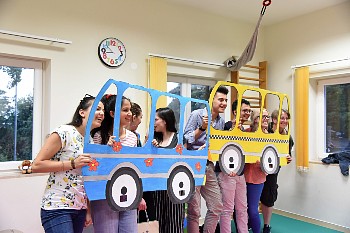
According to the data from the Annual Report on the Implementation of the Law on Youth Councils of the Ministry of Demography, Family, Youth, and Social Policy in 2018, only 15% of local, regional (regional) self-government units had an active youth council. In other words, out of 576 municipalities, cities and counties in Croatia, only 92 of them have fulfilled their legal obligation.
 How rural is rural exactly? – the case of the city of
How rural is rural exactly? – the case of the city of
Opatija is gravitating towards the urban agglomeration of Rijeka, the third biggest city in Croatia and is part of the 99.24% of the territory of Croatia that is defined as rural or mixed area1. In reality it means that you basically know everyone you meet along your way to the grocery store, and if you don’t wave and say hello to your neighbour across the street, she will probably tell your parents you didn’t say hi even before you come back home from the store.
On the other hand, it also means that young people often go to college in Rijeka or even Zagreb and usually stay there, find jobs and start their career and families and never come back to Opatija. The young and educated working population in such areas emigrate to urban areas (or even abroad) in search of better working and living conditions, which leads to depopulation of rural areas, demographic aging and lack of need for various social and economic services. Insufficient development and social infrastructure (like youth spaces, youth clubs or youth centres) and lack of good public transport makes towns like Opatija undesirable for young people to live in.
I remember one time I was coming home from Rijeka by bus and there were two high school students who were commenting on how beautiful Opatija is as we were driving through the town, and one boy said to another that Opatija is a place where you come to live when you are old (and ready to die soon).
But Opatija really is beautiful. It is a
 Youth participation in Opatija is a myth more than a reality
Youth participation in Opatija is a myth more than a reality
According to the data from the official census of the Central Bureau of Statistics from 2011, there were 1 787 young people aged 15 to 30 living in Opatija, who made up 15% of the population. The decline in the number of young people in Opatija can be seen in the data from 2018 available from the Ministry of the Interior, which shows that the number of people in the age group 15 to 30 years with residence in Opatija was 1 625. In the database of associations, a total of 242 active associations are registered with headquarters in Opatija. The Association for the Development of Youth Culture “Cultural Front” is the only youth association for young people in Opatija, entirely run by young people for young people.
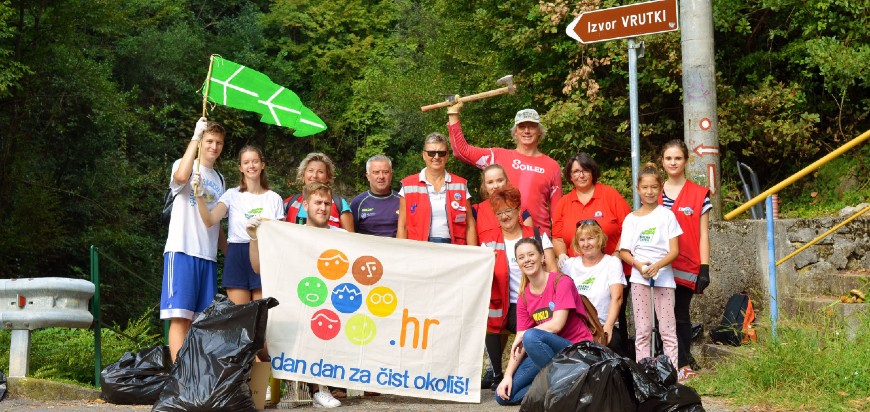
In Opatija, there is no continuous systematic support in youth work, nor is there a centre or club for young people where they could gather, acquire new skills, make new friends and create their first initiatives. Although it has a long tradition in child participation2 and was among the first to implement the Law on Youth Councils, Opatija has lost continuity in its functioning. The reasons range from the basic misunderstanding of decision makers about the role of youth councils and the lack of interest of the civil sector in encouraging a candidacy campaign, to the fact that public open calls for youth council members were posted on the city websites and city bulletin boards during school holidays. Can you really expect young people to read the city’s boring website? A sufficient number of young people (seven plus seven deputies) did not respond to public open calls for membership of the Youth Council for the whole two years. In other words, for two years, Opatija could not find and motivate 14 young people to volunteer and dedicate their time, knowledge and skills to create quality policies for young people and improve their position in Opatija. The 5th convocation of the Youth Council was elected by the City Council at the third attempt, on 27 December 2017, in a political moment shortly after the local elections, meaning that the majority of the members were members of political parties rather than motivated youth leaders from different associations.

The very first strategic document designed for young people that tried to map the needs, goals and attributes of young people of Opatija – the Local Youth Programme of Opatija 2018-2021 – was adopted in January 2019. Participatory action plans over the years of the Local Youth Programme have not been developed, and young people are still not active creators of local youth policy but only their consumers. Decision makers are still not aware of the potential that Erasmus+ in the field of youth participation offers, or of the Europe Goes Local project and other opportunites that could position Opatija as a youth-friendly town. Decision makers still talk about young people, not with young people.
 Seven lessons
Seven lessons
#1 Trust – first things first. Without mutual trust, any joint action makes no sense. On several occasions, I have had the impression that decision makers treat me with a reserve because a) they struggle to understand what the role of youth councils should be or really is and b) they are afraid young people want to invade the status quo and theatrically overthrow and take authority. The former should be educated and helped to understand, and the latter will ultimately judge for themselves politically with such an attitude towards young people.
#2 Common goals, long-term vision and responsibility – young people have to live longest with the political decisions that are being made right now, so they deserve to participate. However, there must be a consensus on where we as a community want to go, what systemic changes we want to influence, and what our common values and priorities are. Ultimately, each side should be able to take responsibility for the society it creates. But the road to a consensus between young people and decision makers is very long and thorny, especially if the local community lacks a problem-solving approach, where reality is beautified because decision makers fear that if they admit there is a problem, they will lose their authority among voters.
I remember being so frustrated after every City Council session I attended. I have often had the impression that we do not understand each other when we talk about young people. Until one day at a City Council session, we invited all present decision makers to openly discuss what youth participation in decision making really means. Ultimately, we invited them to mark on the Mentimeter on which step of Hart’s participation ladder they think we are as a community. The results clearly represent reality. For decision makers, the participation of young people in decision making meant that it was enough to pat young people on the shoulder when they would organise an event and take pictures with them, then post them on their Facebook/Instagram/Twitter page and say “Yeah, look, we have the young people on board.” Some were of the opinion that the only thing young people need is the opportunity to have fun. And that’s fine. At least we know what we are currently on and what we need to strive for together.
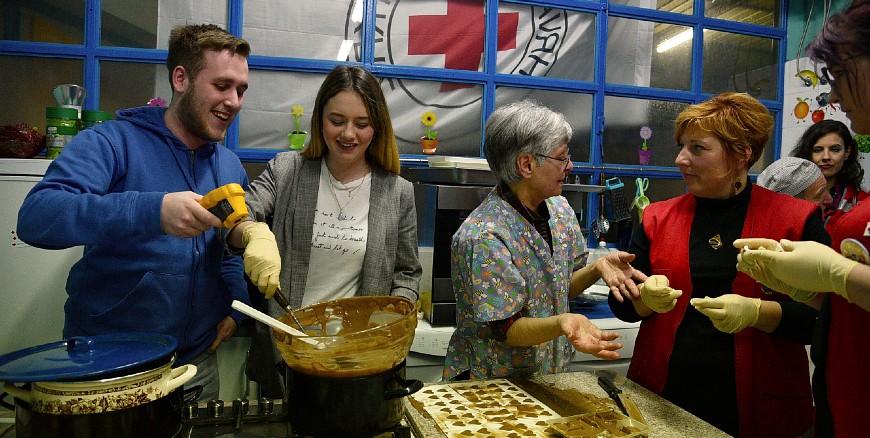
#3 Consistency – the first step is always difficult but staying on the right path and persevering when it doesn’t go right is even harder. In my experience, and when they happened, short ad hoc youth initiatives in Opatija helped to start positive stories but the lack of consistency killed them. It is not true that young people are inert and uninterested in participating in decision making. Young people speak, warn, co-operate but eagerly fight battles with the sluggish state apparatus and many give up. Imagine that in 2018 you clearly articulated to decision makers that you need a space where after school, and while waiting for the bus (because the traffic connection in rural areas is a story in itself), you can write homework or play guitar with friends, and in 2020 there are no indications of solving this problem, not even in sight. In a small but bureaucratic environment, spiced up with corruption, the consequences are enormous, both for young people and local communities. Young people need to see the results of their participation first-hand and should feel that, in the long run, they still get added value for their participation. Whether it is participating in a survey on the needs of young people in which they will give their opinions, or participating in a project creating a public space for young people – young people should be constantly informed about progress on what has been achieved from the foundations of their inputs.
Fortunately, there are
#4 Focus and intrinsic motivation – members of youth councils in Croatia can be young people aged 15 to 30 years without any prior knowledge of the functioning of local (regional) self-government, youth policies and youth work. And that’s okay because I believe the youth council is a kind of playground for practising and learning about democracy, leadership skills and advocacy. I will best describe the three years of the mandate if I say that the first year we had no idea what we were doing, the second we tried to compensate for the lack of content for young people, and only by the third did we realise that what we think young people need is not always what they really need. I guess it was a proces of learning but it was painful sometimes. For some, this experience was a way to burnout. But at the end of the day, the focus, intrinsic motivation and the values you firmly believe in are something that help when systematic support is lacking. And even though you feel like you are not making any progress, one day you will look back and see how it all made sense.
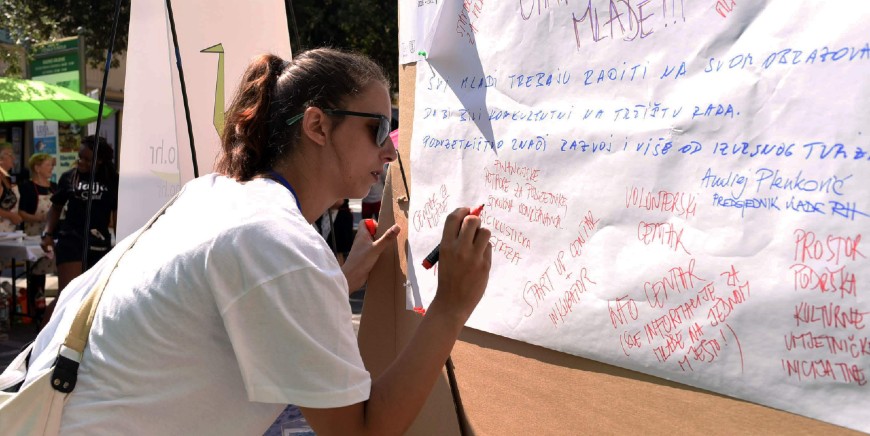
#5 Reach out! – you are not alone. Stop agreeing to closed doors and unanswered emails. Look for a partner somewhere else. Read, explore, ask questions. There is an amazing pool of resources on youth work and youth participation you can access for free. You do not have to make something remarkable, revolutionary or never seen. There are a lot of examples of good practice. You just have to find what works for your community and make it your own. Towards the end of 2019, the Co-ordination of Local Youth Councils in Primorje-Gorski Kotar County was established with the aim of gathering members of youth councils from other rural areas of this region. We realised that we can co-operate together with Kastav, Kostrena, Viškovo, Rijeka and Crikvenica and advocate for change more strongly. We have also worked with a lot of international partners which broadened our horizons and enabled us to think about participation at local, national and even the European level.
#6 Fail, fail and fail again – did you even live if you were not ashamed of your first public appearance, totally missed activity, meeting with the principal of Opatija’s high school where you arrived confident because you thought you’d arrived early, and finally realised that you’d made a mistake and came half an hour later than the agreed time? Whether it’s mistakes in communication or mistakes in understanding your true role, I think it’s never too late to start over. It’s just important not to give up. And even when you feel like something did not succeed, keep going.
#7 It’s okay not to know all the answers – let’s be realistic, who knows the answers to all the questions? Neither young people nor decision makers often know everything. But we are here together and we need to be ready to take responsibility and figure it out together.
1. According to the model of allocation of rural areas of Croatia for the purposes of monitoring the impact of rural development measures.
2. You can find out about the Children’s City Council at https://dnd-opatija.hr/.
3. Check out more at https://www.varazdin2022.eu/.

